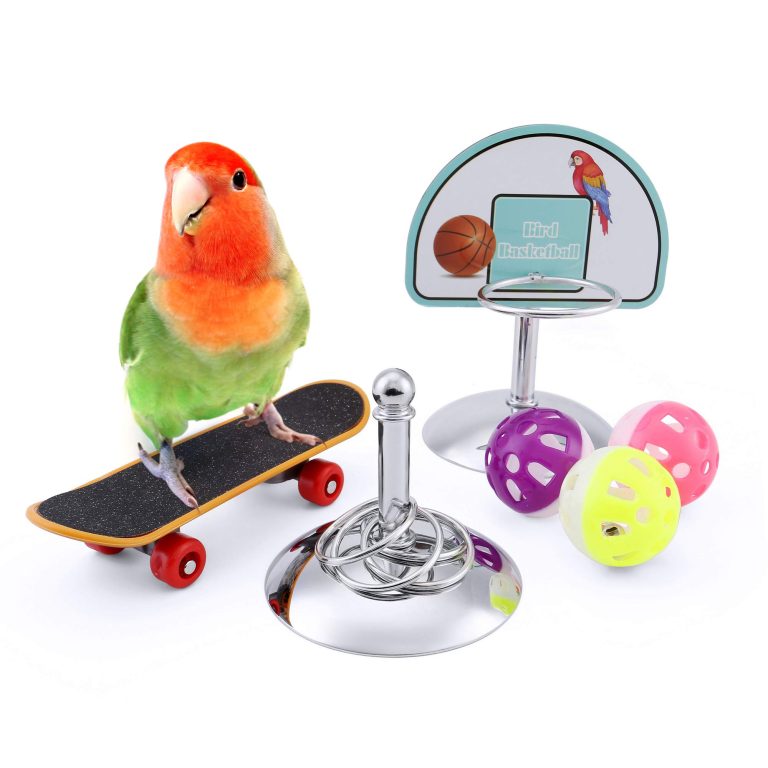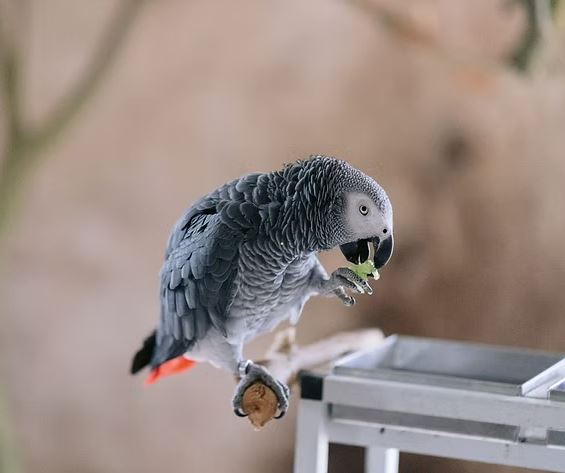How to Get a Pet Macaw to Trust You
To gain the trust of a pet bird, show patience and consistency in your actions, movements, and words. Spending time near the bird’s environment and offering food and treats can also build trust.
Are you a new bird owner or someone who has recently adopted a feathered companion? Establishing trust is crucial for a positive and meaningful relationship with your pet. Birds, being prey animals, naturally take time to adjust to their surroundings and human companions. However, with patience and simple techniques, you can gain your bird’s trust and enhance your time together.
In this comprehensive guide, we will explore effective ways to build trust with your pet macaw, focusing on understanding their psychology, interpreting their body language, and creating a safe and comfortable environment. We’ll also delve into positive reinforcement techniques, training methods, socialization tips, and the importance of a healthy diet and exercise. Join us on this journey to develop a deep bond with your macaw and discover the joys of a trusting and fulfilling relationship.
Understanding Your Macaw
Petting a macaw can be a rewarding and fulfilling experience for any pet owner. However, winning your pet bird’s trust may not be as easy as it seems. In this blog post, we’ll explore the different ways to build a bond with your feathered friend, focusing on understanding your macaw.
The Psychology of Macaw
Birds, like humans, have distinct personalities. It’s crucial to understand your macaw’s way of thinking to provide it with the right care and attention it needs. Below are some key points to keep in mind:
- Macaws are social creatures. In the wild, they live in flocks, where they preen, play, and groom each other. As pets, they crave the same level of social interaction.
- Pet birds are intelligent and curious. Activate its curiosity by providing a stimulating environment with toys, puzzles, and treats that vary every day.
- Reward good behavior. Macaws respond well to positive reinforcement. Praise your bird when it behaves well with its favorite treats and toys.
How To Read Your Macaw’s Body Language
Being able to understand what your macaw is feeling can help you build trust and communication with your pet bird. Here are some ways to interpret their body language:
- Tail position: A raised tail means your macaw is happy, and a lowered tail indicates it is upset or stressed.
- Head position: When a macaw tucks its head under its wing or hides its face, it means that it wants to sleep or is bored. A macaw that raises its head wants to play or interact with its owner.
- Wing position: A macaw that shakes its wings is stretching or shaking off dirt or dust. An outstretched wing means your bird is relaxed and contented.
Common Macaw Behavior Patterns
Macaws are lively and expressive birds, with unique personalities. Knowing their body language is one thing, but understanding their behavior patterns is essential to building trust. Here are some of the common behavior patterns of macaws:
- Vocalization: Macaws are noisy birds and communicate through calls, whistles, and squawks. Learn to interpret its vocalization, as it may indicate changes in its environment or mood.
- Playtime: Macaws love to play and be active. A bored macaw may chew on furniture or feathers, so provide it with toys and puzzles to overcome boredom.
- Grooming: Grooming is essential to a macaw’s mental and emotional well-being, and it does it through preening. Bond with your bird by helping it groom its feathers.
Understanding your macaw’s psychology, body language, and behavior patterns is crucial to building a strong bond and trust with your pet bird. Keep in mind that every macaw is unique, and it might take a while to understand its personality and preferences.
However, with patience, time, and love, you can build trust and a lifelong friendship with your pet macaw.
Building Trust With Your Macaw
Petting a macaw is an amazing experience, but what most people don’t realize is that it’s not so easy to get the bird to trust you. Building trust is the foundation of pet and owner relationships. In this section, we will guide you through ways to build trust with your macaw.
Creating A Safe, Comfortable Environment
Creating a safe and comfortable environment for your pet bird is the first step in building trust. Birds are sensitive to their surroundings, and they tend to react negatively to stress. To make your macaw feel at ease, make sure the environment is safe and comfortable.
Here are some tips:
- Create a quiet space where your macaw can rest undisturbed.
- Keep the cage clean and hygienic at all times. Macaws appreciate a clean environment.
- Provide a healthy diet of fresh fruits, veggies, and clean water daily.
The Importance of Consistency and Routine
Consistency and routine play a critical role in building trust with your pet macaw. Birds thrive on patterns and routines; it helps put them at ease, and gradually they’ll acclimate to your presence, build trust with you, and become more comfortable.
Here are a few things you can do:
- Feed your macaw at the same time each day.
- Set up a consistent sleeping, playing, and waking routine.
- Spend time with your bird frequently.
Building a Bond Through Positive Reinforcement
Positive reinforcement is an excellent way to strengthen the bond between you and your macaw, building trust and a more positive relationship with the bird. Here are a few tips on how you can reward your pet birds for a good behavior:
- Offer a favorite treat after a good interaction.
- Give lots of praises when the macaw behaves nicely.
- Offer the macaw toys that she loves when she has been good.
Positive Reinforcement Techniques
Training your macaw through positive reinforcement is excellent for building your pet’s trust. Positive reinforcement encourages good behavior, which will help in building trust faster. Here are some tips for positive reinforcement training:
- Use a clicker and a treat to reinforce good behavior.
- Use a command word to reinforce behavior repeatedly.
- Increase the difficulty level gradually.
Avoiding Negative Reinforcement
Negative reinforcement should be avoided when trying to build trust with your macaw. Negative reinforcement, such as punishing your bird when they misbehave, will result in more stress and discomfort, making it difficult to build trust with your bird. Instead, focus on positive reinforcement techniques to encourage good behavior.
Building trust with your macaw requires effort, patience, and consistency. Provide a safe and comfortable environment, maintain consistency, use positive reinforcement, and avoid negative reinforcement techniques. With these tips, your macaw will be your trusted companion in no time.
Training Your Macaw
How to get a pet bird to trust you:
Macaws are incredibly fun and intelligent pets. They can be quite affectionate with their owner and even learn a few tricks along the way. However, before getting to that point, you need to earn your macaw’s trust first. Training your macaw is an excellent way to build a strong bond.
In this section, we will cover the most basic training commands to get you started, step-by-step instructions on how to teach your macaw commands, socialization tips, and effective strategies to encourage independent play with your macaw.
Basic Training Commands
Getting started with basic command training is essential to improving your macaw’s behavior. Here are a few of the most fundamental commands to teach your macaw:
- Step up: This command is one of the most important for a pet owner. Your macaw will learn to step onto your hand or shoulder, allowing you to move and interact with them confidently.
- No: Teaching your macaw the word “no” is an excellent way to let them understand good and bad behaviors.
- Come: Having your macaw come to you on command will enable you to control their movement when they are out of their cage.
- Stay: Training your macaw to stay in place helps keep them on their perch, stand, or wherever you may set them down.
Step By Step: How To Teach Your Macaw Commands
Teaching your macaw commands may seem complicated, but it is relatively simple if you follow the steps below:
- Choose the command you want to teach.
- Say the command simultaneously with the action and give your macaw a treat or positive reinforcement when they comply. For instance, repeat “step up” and gesture your finger for the macaw to step up on it.
- Repeat the process until they understand the connection between the command and the action.
- Gradually reduce the treats and practice the commands often.
Socialization
Macaws are social creatures that require lots of attention to form a strong bond with their owner. By socializing your macaw, you are helping them feel more comfortable in different situations and around other people. Here are a few socialization tips:
- Handling: Start handling your macaw from a young age so they can develop trust and learn to enjoy the interaction.
- Exposure: Introduce your macaw to new people, different sounds, and other animals to help them become well-adjusted to their surroundings.
- Respect: Always respect your macaw’s boundaries, and never force them to do anything they do not want.
Effective Strategies For Socializing Your Macaw
Here are a few effective strategies for socializing your macaw:
- Interactive play: Spend time playing games like peekaboo or fetch with your macaw to stimulate them mentally and boost their confidence.
- Praise: Praise your macaw for good behaviors and small accomplishments.
- Routine: Create a daily routine to help your macaw feel at ease and comfortable in their surroundings.
Encouraging Independent Play
Macaws are curious birds and need toys that are both challenging and fun to keep them occupied. Here are a few toys and activities to keep your macaw stimulated:
- Puzzle toys: Solve problems with puzzle toys that require them to use their beaks and minds to find treats hidden inside.
- Chewing toys: Provide a variety of toys that encourage chewing and shredding, such as wooden blocks or hanging ropes.
- Outdoor time: Take your macaw outside to get some fresh air and experience nature.
Training your macaw, socialization, and independent playtime are all vital to enhancing your bond with these beautiful birds. By following the tips and strategies above, you can help your macaw become a happy and well-adjusted companion.
Maintaining Trust
Once you have successfully gained the trust of your pet bird, the next important step is to maintain it. Birds are intelligent and will watch every action of their owners, so it’s crucial to have a consistent and positive approach.
The following section will outline some essential tips for maintaining trust with your pet macaw.
Common Mistakes To Avoid
There are a few things that should be avoided to maintain the trust of your pet bird. These common mistakes include:
- Avoid yelling or screaming at your pet bird. Birds have sensitive hearing, and loud noises can be frightening, leading to a lack of trust and even aggression.
- Don’t ignore your pet bird. Lack of interaction can result in bird depression and lead to trust issues.
- Avoid sudden and unexpected movements around your pet bird. Sudden movements can startle birds, and they might become nervous and scared.
Punishments And Negative Consequences
Using negative reinforcement to punish a pet bird for any misbehavior can negatively impact the bird’s trust and bond with its owner. Avoid any physical punishment, yelling, or intimidating behavior as it will only lead to mistrust and fear. Instead, use positive reinforcement to encourage desirable behavior through rewards or treats.
Breaking Trust
If any trust issues occur, do not ignore them; act upon them. You should always address any breach of trust that has occurred. Anytime there is an instance of a breach of trust, the best approach is to start from scratch by taking small steps to rebuild your pet bird’s trust.
Healthy Practices and Habits
A healthy and happy pet bird is more likely to trust its owner. Incorporating healthy practices and habits into your routine can help maintain your pet bird’s trust. These include:
- Providing a comfortable and safe environment for your pet bird.
- Regular cleaning of their food and water dishes, cage, and toys.
- Spending adequate time with your bird and engaging in activities they enjoy, such as playing with toys and offering visual or auditory stimulation, like tv or music.
- Consistency in your interactions, routines, and approach towards your pet bird.
Healthy Diet And Exercise
Providing a balanced and healthy diet and enough exercise is essential for pet birds. Proper nutrition and activity levels ensure your pet bird’s overall well-being and longevity. A healthy bird is more likely to form a bond and trust with its owner.
Importance Of Regular Veterinary Checkups
Regular veterinary checkups are essential to detect and treat any potential health problems in your pet bird. An unhealthy bird can be unresponsive and distrustful of its owner, leading to a lack of trust and a weakening bond.
Maintaining trust with your pet bird requires consistency, patience, and positive reinforcement. By avoiding common mistakes, developing healthy habits, providing proper nutrition and exercise and regular veterinary checkups, you can maintain your pet macaw’s trust and build a strong bond built on mutual respect and love.
Frequently Asked Questions On Pet A Macaw – How To Get A Pet Bird To Trust You
How Can I Get A Macaw To Trust Me?
To get a macaw to trust you, spend time near their cage or place, talk gently to them, offer treats or toys, and be patient. Once the macaw begins to approach you and take treats from your hand, slowly work towards building trust and creating a bond.
What Should I Do If My Pet Bird Is Fearful?
If your pet bird is fearful, it’s essential to take things slowly and not force interaction. Create a safe and comfortable environment, gradually introduce new objects or people, and offer treats as a positive reinforcement. Be patient, and let the bird approach you on its terms.
Can I Train A Macaw To Do Tricks?
Yes, you can train a macaw to do tricks such as stepping onto your hand, waving, and even speaking. Use positive reinforcement techniques such as clicker training, break the trick down into smaller steps, and be patient. Always end training sessions on a positive note.
What Type Of Environment Is Best For A Macaw?
A macaw needs a large, spacious cage that allows ample room for them to move around and exercise. Ideally, the cage should be placed in a quiet area away from direct sunlight, drafts, or potential hazards. Macaws are social creatures, so it’s essential to provide plenty of interaction and mental stimulation.
Can Macaws Be Aggressive?
Macaws can be aggressive, especially if they feel threatened or stressed. Signs of aggression include biting, screaming, or feather plucking. To avoid aggression, ensure the macaw has a comfortable and stress-free environment, provide ample space to play and exercise, and avoid sudden movements or actions that could startle them.
How long do macaws live as pets
Macaws have long lifespans, and as pets, they can live for several decades. On average, the lifespan of a macaw in captivity ranges from 30 to 50 years, but with proper care, some macaws have been known to live even longer, reaching 60 years or more. It’s important to note that providing a healthy diet, regular veterinary care, mental stimulation, and a safe environment are crucial factors in ensuring the well-being and longevity of pet macaws.Macaws have long lifespans, and as pets, they can live for several decades. On average, the lifespan of a macaw in captivity ranges from 30 to 50 years, but with proper care, some macaws have been known to live even longer, reaching 60 years or more. It’s important to note that providing a healthy diet, regular veterinary care, mental stimulation, and a safe environment are crucial factors in ensuring the well-being and longevity of pet macaws.
Are blue and gold macaws good pets?
Blue and gold macaws can make wonderful pets for the right owners. They are intelligent, social, and have vibrant personalities. When properly cared for, macaws can live for several decades.
Can you have a hyacinth macaw as a pet?
Yes, hyacinth macaws can be kept as pets. They are known for their striking beauty and intelligence. However, it’s essential to consider several factors before deciding to have a hyacinth macaw as a pet. They require a significant commitment of time, space, and resources. Hyacinth macaws need a large, spacious cage, plenty of mental stimulation, a balanced diet, and regular veterinary care. Additionally, they thrive on social interaction and require a dedicated owner who can provide the time and attention they need. It’s crucial to research and understand their specific care requirements before considering a hyacinth macaw.
Conclusion
To gain a pet macaw’s trust, show patience, consistency, and offer food and treats. Understand their behavior, provide a safe and comfortable environment, and establish a routine. Training, positive reinforcement, and interactive play help build a strong bond. Maintain trust by avoiding loud noises, providing proper nutrition, regular veterinary checkups, and addressing breaches of trust. Remember to be patient, let the bird approach you on its terms, and offer positive reinforcement.Building trust with a pet bird is a process that requires patience, consistency, and dedication. Macaws, in particular, can be quite challenging, but with the right approach, it is possible to establish a strong bond with these magnificent creatures. By creating a calm and comfortable environment, providing your bird with ample opportunities for socialization and enrichment, and respecting its boundaries, you can slowly but surely gain its trust.
Remember to never force interaction, as this can lead to fear and aggression. Instead, allow your bird to come to you on its own terms, and be sure to offer plenty of positive reinforcement when it does. With time and effort, you too can experience the joy of a deep and meaningful relationship with your pet macaw.







